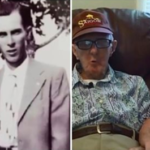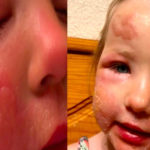We live in a world where shaming is commonplace. We see it online frequently and often, it stems from something that is outside of the person’s ability to control.
Included in the list of things to be shamed over is an autoimmune condition, psoriasis. The condition is not contagious and it is not dangerous to others but when someone suffers from it, they get plenty of stares and sometimes, unwanted comments.
Julia Apodaca-Lane is a woman who suffers from psoriatic arthritis and psoriasis. She spoke with WVUA about what happened to her that left her feeling ashamed.

Some of the symptoms of Julia’s psoriatic arthritis include psoriasis symptoms. The condition causes skin cells to build up, leading to irritated, itchy patches of dry skin. It is a common condition that is often misunderstood.
Even though psoriasis is not contagious, many people are still concerned that they might catch it and could discriminate against those who have it.
Julia experienced this recently at SmartStyle, a local chain salon in Tuscaloosa, Alabama. She told reporters what happened that day:
“She looks at me. She goes, ‘Are you contagious!’ And I’ve never been treated this way, I mean, about anything.”
“I’ve got some psoriasis on my forehead, that you can see. It’s on my scalp. I have psoriatic arthritis. So it’s just psoriasis.”
Julia was aware that she wasn’t contagious and should not have been treated that way by a hairstylist. In the end, the stylist refused to cut her hair.

Lataya Aaron from the Alabama Board of Cosmetology had the following to say about the rights of the stylist to refuse service to anyone:
“We do have the right to refuse it, you know. Talk to her and tell her to bring some sort of documentation. I can’t take your word for it because we work for the public; we are not doctors. I’d put it like that.”
That being said, Julia still feels that things could have been handled in a kinder manner.

“A kind word goes a long way. It should have been personal and private. […] I feel that because you want to treat people like you would want to be treated.”
In Julia’s estimation, her experience was not kind or compassionate. She still feels an emotional toll was put on her.
“I got to the car and I just sat there and sobbed. Just cried and cried and cried. I mean, like, ugly, heaving sobbing.”
Julia was well aware of her condition but the way she was treated made her feel self-conscious.

“I’m paranoid about it. About people looking at me and not knowing what it is. And she made me feel self-conscious. She made me feel like I had done something wrong. That there was something wrong with me. And while I know that these things aren’t true, it doesn’t mean that you’re not going to think them.”
After she posted her experience, she was in contact with a psoriatic arthritis support group. They let her know that she wasn’t alone and that many people knew how she felt.
“You know, in the moment, you don’t know what the other people are going through. She didn’t know if it was a good pain day or a bad pain day for me. She didn’t know that I just had surgery. And that this was my first time getting out of the house. She didn’t know any of that. I’m 31 and I’m using a cane. And I’ve used a walker before.”
She is using her experience to educate others.

“You don’t know that about the person, so be kind. You know, whether they have something wrong with them or not, you should be able to give them the best service that you can.”
Jason Emerson is the District Manager for Smart Style. He says that appropriate measures have been taken and that they will educate their employees on the issue.






